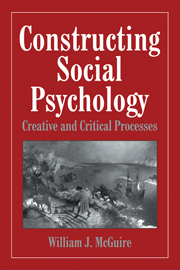Book contents
- Frontmatter
- Contents
- List of Tables and Figures
- Foreword
- 1 Learning My Way
- 2 Immunization against Persuasion
- 3 Attitude-Change Studies
- 4 Integrative Reviews of Social Influence Processes
- 5 Developing Effective Persuasion Campaigns
- 6 Thought Systems: Their Content, Structure, and Functioning
- 7 A Topography of the Phenomenal Self
- 8 Distinctiveness Theory and the Salience of Self-characteristics
- 9 Language and Thought Asymmetries
- 10 Psychology and History
- 11 Winters of Our Discontents: Crises in Social Psychology
- 12 A Perspectivist Epistemology: Knowledge as Misrepresentation
- Selected References
- Index
8 - Distinctiveness Theory and the Salience of Self-characteristics
Published online by Cambridge University Press: 05 October 2013
- Frontmatter
- Contents
- List of Tables and Figures
- Foreword
- 1 Learning My Way
- 2 Immunization against Persuasion
- 3 Attitude-Change Studies
- 4 Integrative Reviews of Social Influence Processes
- 5 Developing Effective Persuasion Campaigns
- 6 Thought Systems: Their Content, Structure, and Functioning
- 7 A Topography of the Phenomenal Self
- 8 Distinctiveness Theory and the Salience of Self-characteristics
- 9 Language and Thought Asymmetries
- 10 Psychology and History
- 11 Winters of Our Discontents: Crises in Social Psychology
- 12 A Perspectivist Epistemology: Knowledge as Misrepresentation
- Selected References
- Index
Summary
The program of research reported in this chapter considers the person as an overloaded information processor who selectively notices the peculiarities in complex stimuli and ignores the more predictable. Bombarded by more information than she or he can effectively encode, the person copes with this overload by a number of techniques reviewed in McGuire (1984a) (e.g., parallel processing, temporary storage for subsequent processing, selective perception, etc.). The research reported here focuses on selective perception as a mode of coping, noticing only the more information-rich (unpredictable, peculiar, distinctive) aspects of a complex stimulus. For example, when one observes a person one is more likely to notice her unusual height than her average weight. When observing a crowd, one is more likely to notice a member's ethnicity the more ethnically heterogeneous the crowd is, as defined by (a) the number of ethnic groups represented and (b) the equipotentiality of the members' distribution over these ethnic groups (e.g., if 95% of people are right-handed, it is efficient not to notice handedness but to assume that everyone is right-handed, and almost always be correct). These predictions are made on a strictly cognitive basis, without recourse to motivational factors like perceived powerlessness of minorities or rareness value. This theorizing applies equally to noticing the color versus the size of people and of geometrical figures.
- Type
- Chapter
- Information
- Constructing Social PsychologyCreative and Critical Aspects, pp. 263 - 293Publisher: Cambridge University PressPrint publication year: 1999



